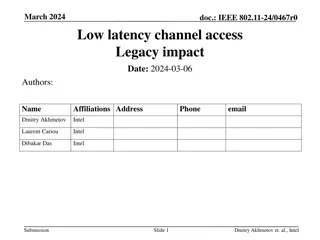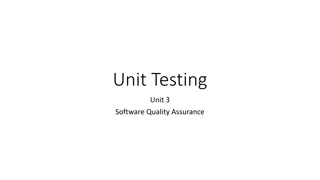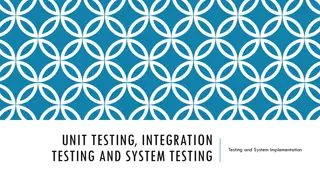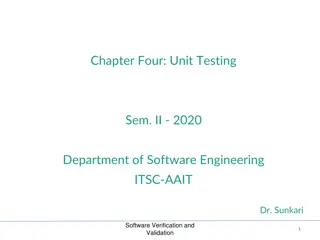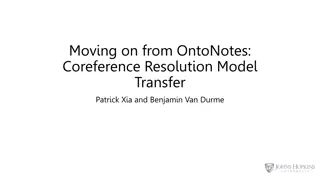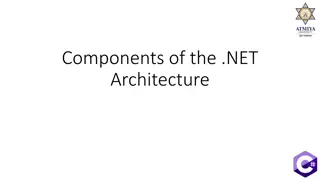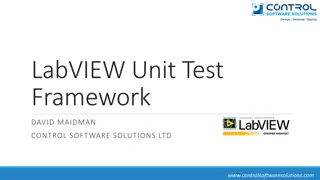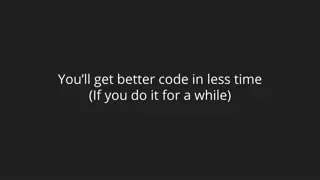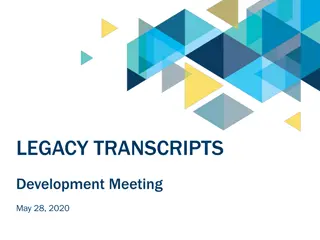Unit Testing Legacy Code: Hijacking Singletons for Testing
Enabling unit testing of legacy code requires making changes without altering existing calling code. Singleton pattern poses challenges for testing, but strategies such as hijacking can be employed for effective unit testing. David Benson shares insights on legacy code attributes and unit testing approaches in this informative presentation.
Uploaded on Sep 27, 2024 | 0 Views
Download Presentation

Please find below an Image/Link to download the presentation.
The content on the website is provided AS IS for your information and personal use only. It may not be sold, licensed, or shared on other websites without obtaining consent from the author.If you encounter any issues during the download, it is possible that the publisher has removed the file from their server.
You are allowed to download the files provided on this website for personal or commercial use, subject to the condition that they are used lawfully. All files are the property of their respective owners.
The content on the website is provided AS IS for your information and personal use only. It may not be sold, licensed, or shared on other websites without obtaining consent from the author.
E N D
Presentation Transcript
Hijacking singletons to enable unit testing of legacy code David Benson S&P Global
About me 30 years of industry experience 20 years with S&P Global through various acquisitions Technical Architect with the Fincentric division, where we focus primarily on the individual or retail investor. I work with our teams to deliver real-time financial information
Disclosures I m not selling or promoting a commercial tool I m not promoting an open-source tool
Unit testing of legacy code You need to make changes to legacy code to either fix bugs or add features You own the code and can make changes to facilitate unit testing Goal: Leave the existing calling code as unchanged as possible
What are attributes of legacy code? Age Original designers and/or implementers are not available Classes/methods violate single responsibility principle Large methods, comingling data and logic Minimal/no unit tests Outdated tool chain/language version Singletons
Singletons One of the most commonly used design patterns from the Gang of Four book "Design Patterns" Now referred to as an anti- pattern Singletons allow for accessing functionality without having to pass dependencies Difficult to use with mocking frameworks like Google Mock
Use case: Logging Timestamps, thread id Log levels and thresholds Formatting Log to file, network, etc File limits size, time, etc Duplicate suppression
Trivial logger legacy singleton static mutex g_mutex; void example() { struct Logger { debug("Legacy singleton logger"); static Logger * instance() { } if (!m_singleton) { void debug(string_view message) { lock_guard lock(g_mutex); Logger::instance()->debug(message); if (!m_singleton) } m_singleton = new Logger(); } return m_singleton; } private: Logger() = default; ofstream m_file{"log.txt"}; static Logger * m_singleton; };
Trivial logger Meyer singleton struct Logger { void example() { static Logger & instance() { debug("Trivial logger"); static Logger logger; } return logger; } void debug(string_view message) { void debug(string_view message) { Logger::instance().debug(message); m_file << message << "\n"; } } private: Logger() = default; ofstream m_file{"log.txt"}; };
Lifetime - manually controlled struct Logger { TEST(LifetimeLogger, lifetime) { static unique_ptr<Logger> & instance() { debug("Lifetime logger"); static unique_ptr<Logger> logger = setLogger(nullptr); make_unique<Logger>(); // read and verify log contents return logger; } } }; void setLogger(unique_ptr<Logger> logger) { Logger::instance().swap(logger); }
Lifetime with weak pointers struct Logger { TEST(RAIILifetimeLogger, single_instance) { static shared_ptr<Logger> instance() { auto logger1 = Logger::instance(); static mutex mutex; auto logger2 = Logger::instance(); static weak_ptr<Logger> logger; ASSERT_EQ(logger1, logger2); } lock_guard lock(mutex); if (logger.expired()) { TEST(RAIILifetimeLogger, scoped_lifetime) { auto result = { make_shared<Logger>(); auto logger = Logger::instance(); logger = result; } return result; { } auto logger = Logger::instance(); } return logger.lock(); } } };
Mockable singleton with inheritance struct Logger : public Interface { TEST(MockableLogger, message) { static unique_ptr<Interface> & instance() { auto mock = static unique_ptr<Interface> logger; make_unique<MockableLoggerMock>(); return logger; EXPECT_CALL(*mock, debug(_)); } setLogger(move(mock)); }; debug("Mockable logger"); } // Once in main setLogger(make_unique<Logger>()); void example() { debug("Mockable logger"); }
Use case: Database Access Connection pooling Logical to physical mapping of servers, databases and stored procedures Protection from SQL injection attacks Caching Replication 1M LoC: 900 database calls
Modern approach vector<OpenHighLowClose> getPrices(IDatabasePool & pool) { auto connection = pool.getConnection(); auto response = connection->execute(PricingQuery); vector<OpenHighLowClose> prices; // parse response fields into object return prices; }
Test with GMock TEST(ModernPrices, getPrices) { // GIVEN: mock pricing data ConnectionMock connection; EXPECT_CALL(connection, Execute(_)).WillRepeatedly(Return(R"([{"Date":"2024-03-01T09:30:00", "Open":123.45}])"_json)); DatabasePoolMock pool; EXPECT_CALL(pool, getConnection()).WillRepeatedly(Return(&connection)); // WHEN: we ask for prices auto response = getPrices(pool); // ... }
Unit testing without Inheritance GMock requires inheritance Switching to templates isn t viable
Existing code we want to test vector<OpenHighLowClose> getPrices() { Query query; Response response; auto ok = query.execute(PricingQuery, response); vector<OpenHighLowClose> prices; // parse response fields into object return prices; } bool Query::Execute(int query_id, Response & response) { auto connection = ConnectionPool::instance().getConnection(); return connection.Execute(query_id, response); }
Injecting behavior using CommandHandler = function<bool(int, Response &)>; struct Connection { Connection(CommandHandler handler) : m_handler(move(handler)) {} bool Execute(int query_id, Response & response) { if (m_handler) { return m_handler(query_id, response); } // regular implementation return true; } private: CommandHandler m_handler; };
Injecting behavior struct ConnectionPool { static ConnectionPool & instance() { static ConnectionPool pool; return pool; } void setHandler(CommandHandler handler) { m_handler = move(handler); } Connection getConnection() { return Connection(m_handler); } private: CommandHandler m_handler; };
Mock response struct MockResponse { MockResponse() { ConnectionPool::instance().setHandler( [this](int query_id, Response & results) { auto it = m_service_responses.find(query_id); if (it != m_service_responses.end()) { results = it->second; return true; } return false; }); } private: std::unordered_map<std::int32_t, Response> m_service_responses; };
Example unit test TEST(Prices, getPrices) { // GIVEN: mock pricing data auto mock = MockResponse(); mock.add(PricingQuery, R"([{"Date":"2024-03-01T09:30:00", "Open":123.45}])"_json); // WHEN: we ask for prices auto prices = getPrices(); //... }
Mock capabilities Can mock multiple calls, each with different reponses Can mock a call with different inputs, each with different reponses Different responses for first and subsequent calls Once you have defined a mock, all subsequent calls are mocked. The destructor will remove all configurations. We fail on empty
Example unit test scope creep TEST(Prices, getPricesExtended) { auto mock = testing::MockResponse(); mock.add(PricingQuery, R"([{"Date":"2024-03-01T09:30:00","Open":123.45}])"_json); mock.add(SymbolTranslation, R"({"RIC":"SPGI.K","XID":123})"_json); auto symbol = Symbol("SPGI.K"); // Looks up symbol mapping mock.add(ExchangeHours, R"([{"Date":"2024-03-01","Open":"9:30", "Close":"16:00"}])"_json); // Looks up exchange hours auto [startTime, endTime] = symbol.exchange().getOpenCloseTimes("2024-03-01"); auto prices = getPrices(symbol, startTime, endTime); //... }
Test data Once you have the capability of mocking calls, the next question is how to get live responses to put into unit tests Add a tracing facility Enabled via request for a limited duration Enabled via command line switch Intended for collecting test data locally, not designed to scale for production use
Use case: API calls Service discovery Connection pooling Serialization/deserialization 1M LoC: 300+ API calls
Existing code we want to test struct Lookup { Lookup() { m_client.Init("XrefServer"); } Symbol translate(string const & ticker, string const & symbolSet) { //... auto status = m_client.Execute("Translate", request, response); //... } Client m_client; };
Solution: Add a singleton struct SharedLookup { Symbol translate() { Response response; m_client.Execute("Translate", response); //... return {}; } ISharedClient & m_client{getClient("XrefServer")}; };
Solution: Add a singleton ISharedClient & getClient(string const & pool) { struct ISharedClientPool { return getPool()->getClient(pool); virtual ~ISharedClientPool() = default; } virtual ISharedClient & getClient(string const &) = 0; }; unique_ptr<ISharedClientPool> & getPool() { static unique_ptr<ISharedClientPool> pool; struct ISharedClient { return pool; virtual ~ISharedClient() = default; } virtual bool Execute(string const &, Response &) = 0; void setPool(unique_ptr<ISharedClientPool> pool) { }; getPool().swap(pool); }
Example unit test TEST(MockableApi, translation) { Response data = R"({"RIC":"SPGI.K","XID":123})"_json; SharedClientMock client; EXPECT_CALL(client, Execute(_, _)) .WillOnce(DoAll(SetArgReferee<1>(data), Return(true))); auto pool = make_unique<SharedClientPoolMock>(); EXPECT_CALL(*pool, getClient(_)).WillRepeatedly(ReturnRef(client)); setPool(std::move(pool)); // WHEN: we ask for ticker translation SharedLookup lookup; auto symbol = lookup.translate(); //... }
The hard part: Adoption Code is easy, people are hard Creating a unit testing mechanism for legacy code is a bounded problem Convincing your peers to use it
Adoption: Senior leadership Shift left
Adoption: Product owners Natural tension between features, schedule and quality Changing the definition of done to include unit testing
Adoption: developers Code reviews Review the tests first. Ensures the API is testable and usable Link to unit test documentation and examples Missing tests become tasks which block merging SonarQube quality gate enforcements on new code Testing needs to be scoped as part of the original ticket, not relegated to a future ticket
Questions? Key points: Mockable singleton struct Logger : public Interface { static unique_ptr<Interface> & instance() { static unique_ptr<Interface> logger; return logger; } };
Existing code we want to test vector<OpenHighLowClose> getPrices() { Query query; Response response; auto ok = query.execute(PricingQuery, response); vector<OpenHighLowClose> prices; // parse response fields into object return prices; }
Implementation hidden singleton vector<OpenHighLowClose> getPrices() { unique_ptr<IDatabasePool> & getPool() { Query query; static unique_ptr<IDatabasePool> pool; Response response; return pool; auto ok = query.execute(PricingQuery, response); } vector<OpenHighLowClose> prices; void setPool(unique_ptr<IDatabasePool> pool) { // parse response fields into object getPool().swap(pool); return prices; } } bool Query::execute(int query_id, Response & response) { auto connection = getPool()->getConnection(); return connection->execute(query_id, response); }
Unit test with GMock TEST(LegacyMockable, getPrices) { ConnectionMock connection; Response data = R"([{"Date":"2024-03-01T09:30:00", "Open":123.45}])"_json; EXPECT_CALL(connection, execute(_, _)) .WillOnce(DoAll(SetArgReferee<1>(data), Return(true))); auto pool = make_unique<DatabasePoolMock>(); EXPECT_CALL(*pool, getConnection()).WillRepeatedly(Return(&connection)); setPool(std::move(pool)); // WHEN: we ask for prices auto response = getPrices(); }


